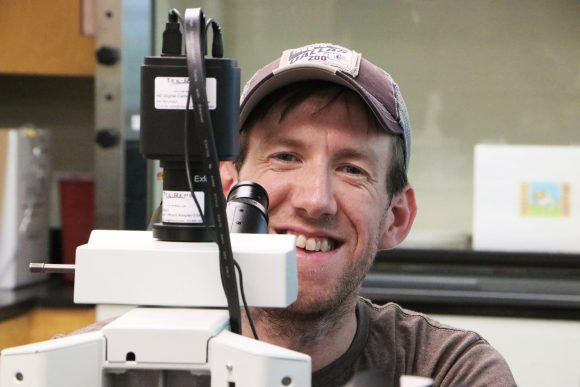In honor of National Veterinary Technician Week, we’re introducing you to our 4 incredible vet techs! Vet techs truly make the zoo world go round. They do everything from helping monitor animals under anesthesia and collecting blood samples, to placing IV catheters and performing endotracheal intubation. Not to mention filling hundreds of prescriptions, laboratory work, and assisting our veterinarians during procedures.
Our $3.75 million A.H. Meadows Animal Health Care Facility consists of five licensed techs, four full-time veterinarians, hospital keepers, and records administration. First up, meet Jason Bartel! Jason is from Flagstaff, Arizona and is the newest addition to our rock-star vet tech team.
How did you become a vet tech?
I have a bachelor’s degree in ecology and evolutionary biology from the University of Arizonam and I also did a two-year veterinary technician program at Pima Community College in Tucson, AZ. During the veterinary technician program, I had two separate part-time internships and then after I graduated I moved to Dallas for a full-time externship here at the Dallas Zoo, which lasted for four months. I was then hired as a part-time technician at the Dallas Zoo before being offered a full-time opportunity in Houston. Then I recently made my way back to Dallas to join the zoo’s hospital staff as a full-time tech!
What does a typical day at the office look like?
I don’t know that there is a typical day, but in the mornings I come in and check whatever treatments we have in the park that day and go to our morning meeting at 7:15. After that, it’s filling any meds for the animals that came in the night before or going out and doing some treatments or assisting the veterinarians with whatever procedures we have that morning. From there, it’s cleaning up all the things we used and prepping any samples we have to be run in the lab. The afternoon is usually for lab work, filling more meds for the animals, and setting up for the next day.
What are some of the most challenging aspects of your work?
There’s a lot of pressure for everything to be exactly right, because we’re working with animals that are ambassadors for their species, so any little mistake can have a huge impact. The sheer variety of animals we work with is also challenging because you have to know the differences between something like a lion and something like a chicken and everything that goes into that, from their normal vital signs, what their blood is supposed to look like, and so on.
What are some of the most rewarding aspects?
I think being able to see an animal thrive on habitat after helping it through any kind of medical treatment is most rewarding for me. A lot of the work we do as techs helps diagnose problems before you even potentially see any signs, and so being able to help save that animal before it’s too late is a feeling unlike anything else. Also being able to be a part of training with an animal that will allow us to monitor its health without needing a major procedure. It’s enjoyable being part of the building blocks of the behaviors needed to do something like a blood draw on an awake tiger or performing an ultrasound on a potentially pregnant animal or taking x-rays of an okapi leg. Building that relationship with the animal is really cool, especially when you’re there from start to finish.
Do you have a favorite animal at the zoo?
At the risk of upsetting anyone, it’s okapi, and specifically Niko. I’ve always had a soft spot for okapi in general. I have to say that rhinos will always be my number one, but we don’t care for rhinos at the Dallas Zoo.
What do you like to do for fun outside of work?
I enjoy watching baseball, college football and hockey, going to concerts whenever possible, trying out new BBQ places, running, and playing piano.
